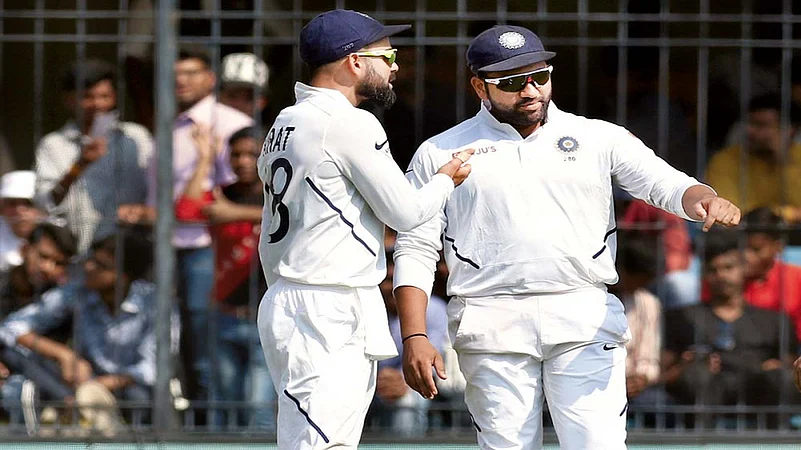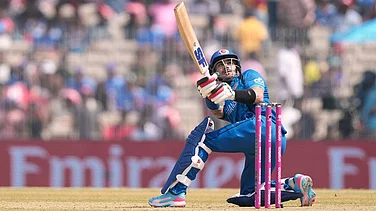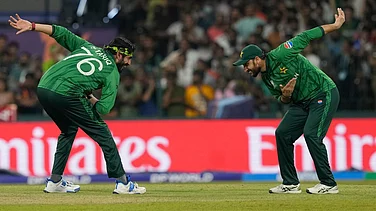Celebrityhood can be a double-edged sword. Ask Virat Kohli. The punchline of a popular beer advertisement very much sums up how divided and vicious fans and ex-cricketers can be. Only flop shows by superstars unite them. It is one thing to lead an IPL franchise, another to captain the Indian cricket team. The knives were out the moment Royal Challengers Bangalore were knocked out of the IPL in UAE. Kohli had become an instant villain for once again failing to win the IPL title for RCB. For eight long years, Kohli has been unsuccessful as captain of one of the glamorous outfits in the world’s premier T20 competition. It perfectly sets up Kohli’s detractors.
With India embarking on a full tour of Australia immediately after the IPL, the obvious question started doing the rounds. Should Kohli relinquish the limited overs captaincy and hand it over to IPL’s most successful captain Rohit Sharma? The India-Australia series starts with the first of the three ODIs in Sydney on November 27. The ODIs will be followed by three T20 internationals before the four-Test series begins with a day-night derby in Adelaide, starting December 17.
The sack-Kohli fuse was lit by Gautam Gambhir in an interview to ESPNCricinfo. The former Indian opener and IPL-winning ex-Kolkata Knight Riders captain, who once had a bitter run-in with Kohli during an IPL match in 2013, said it was time for his Delhi Ranji Trophy teammate to give up the RCB captaincy. “For eight years, Kohli has won nothing...he needs to take accountability,” Gambhir said.

Sanjay Manjrekar was subtle. “If you want to change the scenario and a change of results, you’ve got to change the captain. But I’m not expecting Virat Kohli to put his hand up and say, ‘I have not delivered’. I want the owners to do their job,” said the former Indian Test batsman, a respected TV commentator.
There was overseas ‘support’ for Rohit Sharma as well. It came from the former England captain and a powerful voice on cricket, Nasser Hussain. “His captaincy…he is calm, cool, makes the right decisions at the right time and he has had such a good time with Mumbai Indians that there are various cricketers around the world now, including in India, saying that maybe it is time for Virat to step down from T20s and let Rohit take over. His record speaks for himself,” Hussain told Sky Sports.
However, India’s national selectors did not see Kohli’s future the way Gambhir, Manjrekar or Hussain envisioned. When the Sunil Joshi-chaired selection committee named the squads for the series Down Under on October 26, a good 10 days before the IPL playoffs were due, an injured Rohit Sharma was not in any of the three squads. The BCCI trusted its physio Nitin Patel’s report and it was clear that the selectors wanted Rohit to get 100 per cent fit.
“Why fix something that’s not broken? There has never been any question mark on Virat’s ability as captain in any format of the game. As selectors we have always wanted to find the next vice captain and that’s why you see K.L. Rahul as Virat’s deputy in the ODI and T20s teams. If I personally believed that Rohit was the man to replace Virat as the limited overs captain, I would have certainly tabled his name. It is about consolidating the consistency of the team and India have done well under Virat,” said former Mumbai all-rounder and outgoing national selector Jatin Paranjpe.
But stakeholders in Indian cricket do not always have a logical way of thinking. There are one too many power centres, each riding high on ego and less on pragmatism. Rohit and the MI management seemingly didn’t take their captain’s ‘ouster’ too sportingly. And quite unexpectedly, Rohit turned up at the toss in the first qualifier against Delhi Capitals and added to the conundrum by saying he was “fit and fine”.
Even after scoring a 51-ball 68 in the IPL final against Delhi five days later, Rohit failed to convince the BCCI that he was fit to travel. In a revised list on November 9, updated with injury updates and Virat’s paternity leave after the first Test in Adelaide, Rohit was named in the Test squad but his availability would depend on passing a fitness test at the National Cricket Academy. BCCI president Sourav Ganguly made this adequately clear by saying the Mumbai captain was only “70 per cent fit.”
It is understood that Rohit took painkilling injections on his troubled hamstring to play the last two matches of another successful IPL campaign for Mumbai Indians. To win a record fifth title—Chennai Super Kings have three and KKR two—was an opportunity that Rohit could not let go but for the national selectors, it was country first.
M.S.K. Prasad, whose tenure as chairman of the senior national selection committee ended in March this year , said Rohit would have been the vice captain of the ODI and T20 teams if he was fit and picked for the Australia tour. “As a selection committee we never thought of having two captains. Virat fits perfectly well in all three formats because captaincy doesn’t affect his performance. We had started building the next generation of leaders and Rahul, Shreyas Iyer and Hanuma Vihari are already being groomed,” said Prasad. Rahul was IPL’s top scorer with 670 runs at an average of 55.83 while Iyer (519) was IPL’s fourth best after Delhi Capitals teammate Shikhar Dhawan (618 runs) at No. 2.
Former national selector Raja Venkat, who was part of the selection committee that wanted M.S. Dhoni dropped as ODI captain after the Test debacles in England and Australia in 2011-12, was against split captaincy and said India have always believed in one captain. “When Dhoni was failing as Test captain, we wanted Virat to take over but it did not happen because the BCCI president N. Srinivasan stepped in. Kohli was a natural successor to Dhoni and there is no reason to remove him because he has matured as a man manager and commands a lot of respect within the team,” said Raja Venkat.
To use IPL performance as a yardstick to opt for split captaincy was both bizarre and unfair, explained Raja. “It was very evident that Royal Challengers Bangalore were over-dependent on Virat and A.B. De Villiers to score runs. The day they didn’t score, RCB were in trouble. Finally, their bowling was also found wanting once Chris Morris got injured. With one wicket-taking bowler in Yuzvendra Chahal, you can’t think of going far in IPL. There is no guarantee that by getting a new captain RCB will win the IPL.”
Mumbai Indians success in the IPL had a lot to do with the all-round ability and composition of the team. A captain is as good as his squad and Mumbai Indians have won crucial matches, minus Rohit Sharma. “There is no denying that Rohit is a leading batsman of the world but to say that he is a better captain than Kohli just because Mumbai have won five IPL titles and Kohli has won nothing is not fair. Look at Mumbai’s team depth. They don’t depend on Rohit to score the runs. When someone like Kieron Pollard bats at No. 7, that says enough about a team’s resources,” explained Raja.
Former India wicket-keeper and batsman Vijay Dahiya—who has been associated with international coaches both at Kolkata Knight Riders and Delhi Capitals—provides a different perspective to the split captaincy talk. He looks at the Olympic model and feels cricket can learn from sports like soccer and rugby which are played at the highest level by more than 150 countries globally. Test cricket is played by 10 countries with only the top four—Australia, India, New Zealand and England—performing with a reasonable degree of success and consistency.
“It is a question of vision. It is a question of what we want to achieve as a country. Do we want to win a World Cup or do we want to win bilateral series at home? For every athlete, winning the Olympics is the ultimate dream. For cricketers, winning the World Cup is the biggest challenge. And if we need to have two separate captains and two separate coaches in order to win a World Cup, let the process begin now. Everything is a process and success doesn’t come overnight,” said Dahiya.
There will be a World Cup every year for the next three years starting 2021. India will host the T20 World Cup next year and the ODI World Cup in 2023. This year’s T20 World Cup, which was postponed due to the pandemic, will be held in Australia in 2022. Although India are in no tearing hurry to adopt the split captaincy policy, a lot can change in the next 12 months keeping the pandemic and the congested and backlog calendar in mind. Split sides of the same nation playing simultaneously in different countries could become the latest reality in the reinvented international cricket calendar in these Covid times. But the good thing is India have a solid succession plan in place and Virat Kohli can breathe easy, at least for now.


























